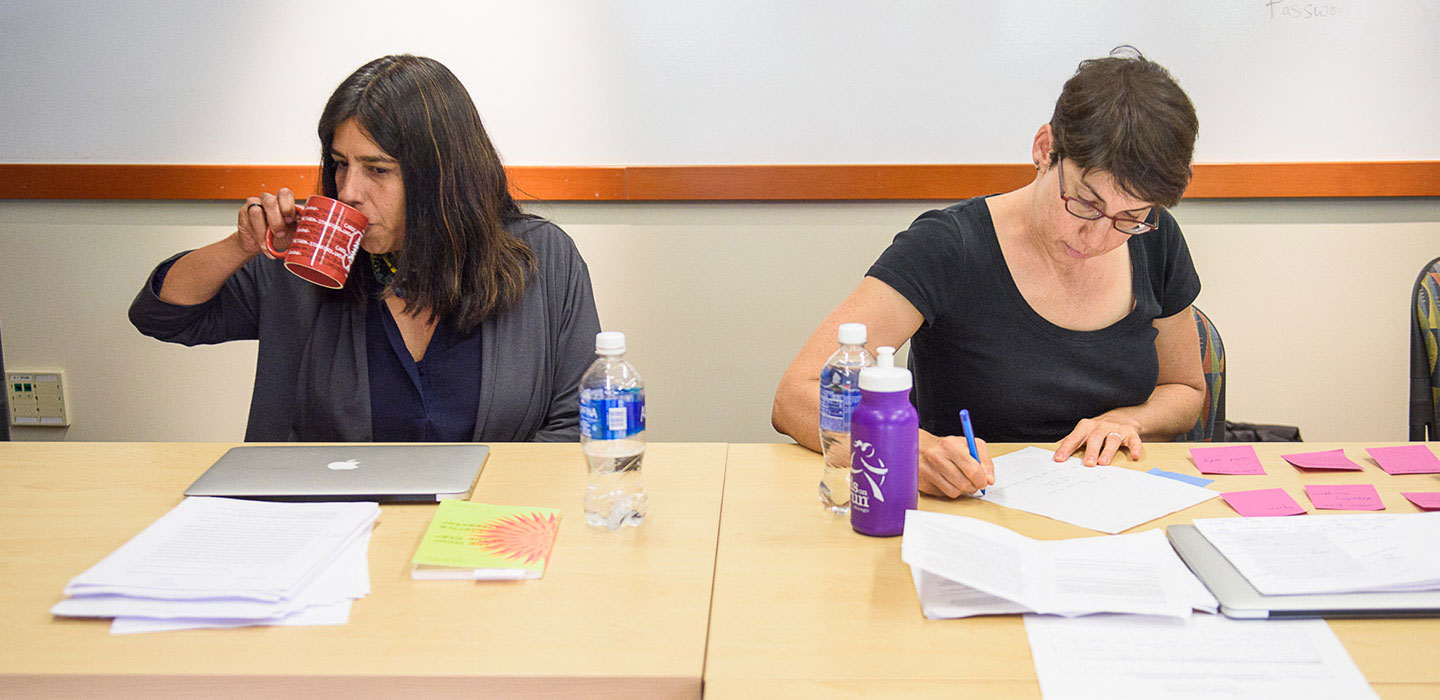
On a recent summer day, paper signs taped to the doors of seminar rooms in Building 250 admonished passersby: “Writers at Work. Quiet, Please.”
Inside the rooms, the only sound from 9 a.m. to 3 p.m. was the click of computer keys – except when lunch was delivered to the 10 Stanford faculty members taking part in a recent Faculty Writers’ Retreat, when conversation flowed.
The group was the latest to participate in a weeklong retreat dedicated to writing sponsored by the Office of the Vice Provost for Faculty Development and Diversity and the Hume Center for Writing and Speaking.
The retreats, which are held during winter and spring breaks and during the summer, offer a private, comfortable space dedicated to writing.
The 12 retreats held since the project began last year have drawn a total of about 50 participants who worked on a wide variety of writing projects: grant proposals, fellowship applications, journal articles and books. Many faculty members have participated in as many as five sessions in the past 18 months.“What started as an experiment quickly turned into one of the most popular faculty development programs on campus,” said Rania Sanford, an assistant vice provost and director of programs in the Faculty Development and Diversity Office.
During the retreats, which were designed for junior faculty members, participants agree not to text, check email or make phone calls.
Jennifer Langer-Osuna, an assistant professor of education, said it was both challenging andliberating to disengage from the digital world during the retreats.
“We have so many new communications coming in all day requesting our time that it is both challenging to let go of the pressure to be on top of an entire week’s worth of communications, and liberating to give myself the permission to put it all aside and just focus on the most important part of my work – my writing,” she said.
Over the course of several retreats, Langer-Osuna revised a journal article, completed a first draft of a manuscript and wrote a proposal for a National Science Foundation grant.
Sharique Hasan, an associate professor of organizational behavior at the Graduate School of Business, said the retreat provided unbroken time to focus undivided attention on polishing and improving the writing of one manuscript – a rough draft of a working paper.
“I also liked the silent camaraderie of my peers working on their own projects in the same room,” Hasan said.
In addition, faculty members said they appreciated the snacks and lunch.
Matthe“Honestly, taking the effort and thought process out of procuring food each day saved me more time and mental energy than I expected – time and energy I could then put into my thinking and writing instead,” said Aliya Saperstein, an assistant professor of sociology, who worked on chapters for a book manuscript during a retreat.
Matthew Kohrman, an associate professor of anthropology, devoted multiple retreats to completing book manuscripts, an ethnographic monograph about China’s tobacco epidemic and an interdisciplinary edited volume, which Stanford University Press has greenlighted for publication.
Kohrman said he relishes the rigor and camaraderie of the retreats.
During one retreat, Ge Wang, an assistant professor at the Stanford Center for Computer Research in Music and Acoustics, started and completed an application for a 2016 Guggenheim Fellowship, which he later won. During other retreats, Wang worked on the book he will complete during the fellowship, The Art of Computer Music Design, which will be published by Stanford University Press.
Wang described the retreats as “temporary safe havens” from meetings, research, advising, administrative tasks and the rest of life.
“It’s really liberating,” he said. “I get in the room and turn off my phone. That comes with a sigh of relief, knowing I have six hours to write. I get a lot done during the retreat, which provides the perfect environment to write. For me, the benefits have always carried beyond the retreat. It gets me in the mindset to keep going.”
Ami Bhatt, an assistant professor of medicine (hematology) and of genetics, spent a retreat reading extensively on the background of a new area of research she was hoping to develop in the lab, and writing the majority of a grant application for the research.
“The life of a faculty member is fantastic at times, but very harried at others,” she said. “In a university setting, where you feel as though you are expected to be everything to everyone, it is nice to prioritize yourself and what you believe to be your most important work for a week.”
The next retreat will take place Dec. 12-17.
Subscribe to our monthly newsletter.